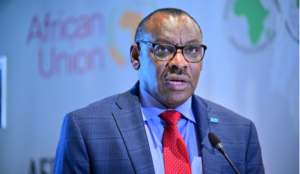
Africa is rich in land and natural resources but the continent is bearing the heaviest burden from rising debt costs, climate-induced displacement and persistent inequalities.
Speaking at the opening of the Africa Land Policy Conference in Addis Ababa, Ethiopia, the United Nations Under-Secretary-General and Executive Secretary of the Economic Commission for Africa (ECA), Claver Gatete said the conference was happening at a defining moment for the world.
“As we speak, the world is navigating converging storms from economic uncertainty to climate upheavals and geopolitical realignments. Unfortunately, it is Africa, a continent rich in land and resources, that often bears the heaviest burden from rising debt costs, climate-induced displacement and persistent inequalities.”
Dr Gatete asked: “How then can we build a just and prosperous Africa when the roots of historical injustice, that have constrained the continent’s development, remain unresolved?
It is in this context that our theme, which is perfectly aligned with the African Union’s 2025 Theme of the Year on Reparations, Justice and Healing, finds its resonance.
Indeed, land governance, justice and reparations are not debates of the past; they are imperatives for Africa’s renewal and the restoration of fairness in global systems,” he said.
He argued that more than just geography, land represents sovereignty, identity and security. It anchors livelihoods, underpins food systems and defines belonging, he said.
Noting that recognizing this, the African Union Commission, the African Development Bank and ECA created the African Land Policy Centre (ALPC) to ensure that Africa’s land and resources serve the people first.
According to Dr Gatete, through the ALPC, frameworks on women’s land rights, responsible agricultural investment and conflict-sensitive governance have been developed.
“Furthermore, we have trained institutions and harmonized land data across regions. However, despite this progress, substantial inequalities remain. How can a continent so rich in land and resources still leave so many without secure access or equitable benefit? The answer lies in history,” he said.
He pointed out that centuries of enslavement, colonization and dispossession reshaped Africa’s political economy and global position, adding that the same extractive logic that once seized land now manifests in inequitable trade systems, inflated borrowing costs and credit assessments that undervalue Africa’s potential.
“Africa holds 30% of the world’s mineral reserves, 65% of its uncultivated arable land and the youngest population on earth and yet it accounts for only a small fraction of global trade and contributes just about 2% to world manufacturing output,” he said.
Dr Gatete said these disparities are the enduring legacy of structural imbalances that continue to shape Africa’s role in the global economy.
“It is not right that they still define who produces, who trades and who benefits. Reparations, therefore, must go beyond acknowledgment of the past. They must transform the systems that perpetuate inequality today. And they must restore balance between resource wealth and shared prosperity,” he said.
Dr Gatete laid out five recommendations and called for:
Reform the global financial and trading architecture.
He stated that illicit financial flows drain an estimated $88 billion each year from Africa, while unfair credit ratings inflate borrowing costs and constrain access to long-term capital.
Additionally, the continent receives less than 3% of global climate finance and faces trade terms and global rules that still favour exporters of raw materials over producers of value-added goods.
A just order must include fairer credit assessments, debt-for-development instruments and stronger African financial institutions.
Justice, on this front, will begin when finance becomes fair.
Secondly, he recommended the strengthening of land governance and tenure security, particularly for women, youth and smallholder farmers.
“Transparent and inclusive systems are the bedrock of social stability and growth.
Without secure land rights, there can be no food security, no peace and, certainly, no lasting development,” he said.
Thirdly, he urged for the leveraging of the African Continental Free Trade Area (AfCFTA) to turn resource wealth into regional value chains.
“With a combined GDP of approximately $3.4 trillion, the AfCFTA offers a continental market scale that presents the opportunity to refine, manufacture and trade African-made goods.
Why should Africa export raw materials only to import finished products?
But when our land powers our industries, our industries will, in turn, power our people,” he said.
Fourthly, he called for the mobilization of the African diaspora as co-architects of transformation, noting that the diaspora is not apart from Africa; it is a vital extension of it.
“Its capital, knowledge and advocacy connect Africa to global innovation.
In this regard, we must create structured mechanisms to channel these resources toward Africa’s industrial and digital ambitions,” he said.
Fifthly, he urged investment in technology, climate resilience and youth empowerment.
“Digital tools can modernize land administration; climate-smart agriculture can sustain ecosystems; and our youth can drive the green and digital revolutions that define Africa’s future. It is imperative that innovation serves as a pathway to shared prosperity,” he said.
The conference is under the theme: “Land Governance, Justice and Reparations for Africans and Descendants of the People of the African Diaspora.”
Source: ghanabusinessnews.com










